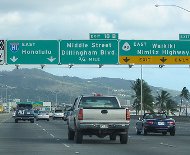8/4/2009
Arizona Failed to Learn Lesson of Hawaii Photo Radar ExperimentArizona mimics failed Hawaii photo radar program from 2002.

Arizona's Department of Public Safety frequently issues press releases with the boast that is is running the "first ever" freeway speed camera program in the United States. This, of course, is not true as the state of Illinois began allowing a private company to deploy speed camera vans on freeways in May 2006. The true claim to the title, however, goes to the state of Hawaii whose speed camera program lasted five months before intense public pressure sent the camera vans packing.
Arizona's program shares a great deal in common with the Hawaii experiment. On December 20, 2000 Redflex Traffic Systems announced to its Australian shareholders that it had landed a new contract with Hawaii's state government that would allow the company to deploy vans on every freeway and state-owned highway on the main islands. As the contract promised $30 million in profit for the private company by 2003, a competitor challenged the bidding process. Unlike a similar challenge in Arizona, the Redflex bid was overturned and the deal handed over to another Australian company, Poltech (now bankrupt) with back-end processing handled by the company that is now Affiliated Computer Services (ACS). As in Arizona, the Hawaiian press rarely mentioned that the cameras were run by an Australian company.
Hawaii's legislature authorized the statewide program with no public notice or opportunity to comment. The first public announcement about photo ticketing outside Australia was made on November 21, 2001 kicking off a firestorm of bipartisan opposition on talk radio. As workers began testing and installing equipment through December, they were pelted with garbage, yelled at and greeted with obscene gestures. After the first 4,962 warning citations were issued at the end of the month, the mobile speed camera vehicles became commonly known as "Talivans."
Tickets were worth $27, plus $5 per MPH over the limit. If the fine was not paid within two weeks, an extra $25 fee was added. Poltech set up cameras on roads with artificially low speed limits to maximize the $29.75 reward payment it received for every ticket the company issued. At first, the cameras only operated on weekdays between 7am and 11pm. Soon, the company put in place a third shift for nearly 24 hour operation. By March, over 10,000 tickets were being issued each month.
Republican state lawmakers were first to break. Some called for "reform" while others called for stopping the program entirely. Judges began dismissing tickets issued for alleged violations of less than 10 MPH over the limit. Honolulu Mayor Jeremy Harris (D) told state officials he did not want speed cameras on city streets. Fearing a political backlash, the state Senate voted unanimously to pull the plug on the cameras.
Initially, the state House and Governor Ben Cayetano (D) clung to the idea of saving the program. Relentless public pressure drove Cayetano on April 10 to drop his threat to veto legislation and instruct the state department of transportation to cancel the speed camera contract.
"The traffic van cam law is the creation of the legislature, and if they want to now cancel the program it will be canceled," Cayetano said in a statement.
With that, the first statewide US freeway speed camera program met its end. Despite seeing similar opposition to an identical program, Arizona lawmakers are clinging to the lucrative program. The group Camerafraud.com continues to channel public outrage into a legislative referendum that will permanently ban automated ticketing machines in the state.
Poltech initially claimed the state owed $4.5 million in compensation for early termination of the Hawaii contract. The company reduced its claim to $2.4 million by December 2002 after an independent audit found the company only incurred $1.5 million in actual costs.


